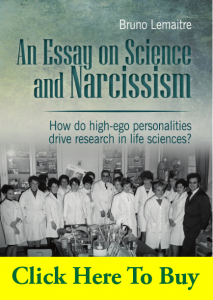 Genetics researcher Bruno Lemaitre introduces his book, An Essay on Science and Narcissism at The Scientist:
Genetics researcher Bruno Lemaitre introduces his book, An Essay on Science and Narcissism at The Scientist:
Psychological studies show that narcissistic individuals tend to use human relationships to attain positions of authority or to improve their own visibility, as illustrated by Monod’s strategic mate choice. The Monod case suggests that it would be naive to see scientists as simply seekers of truth. It is likely that the Nobel laureate enjoyed the position of power that science afforded him, and that it suited his personality. After all, a scientist is someone with expert knowledge who can reveal complex secrets to the public.
But how does narcissism, a personality trait associated with dominance and short-term mating strategies, influence the scientific process? As any minimally aware researcher will recognize, there are aspects of science, especially its politics, that are nonrational but that nevertheless have a tremendous impact on how science is actually practiced. This probably relates to the fact that some scientists are more inclined than others to battle for leadership positions. Scientists high in narcissism tend to use the scientific arena to reach positions of power for their own benefit rather than to serve the community. More.
Note especially, from the author summary above: “Narcissistic researchers also tend to excel at using verbiage that resonates with the short-term expectations of politicians.”
See also: New Scientist offers lessons in successful narcissism
Follow UD News at Twitter!